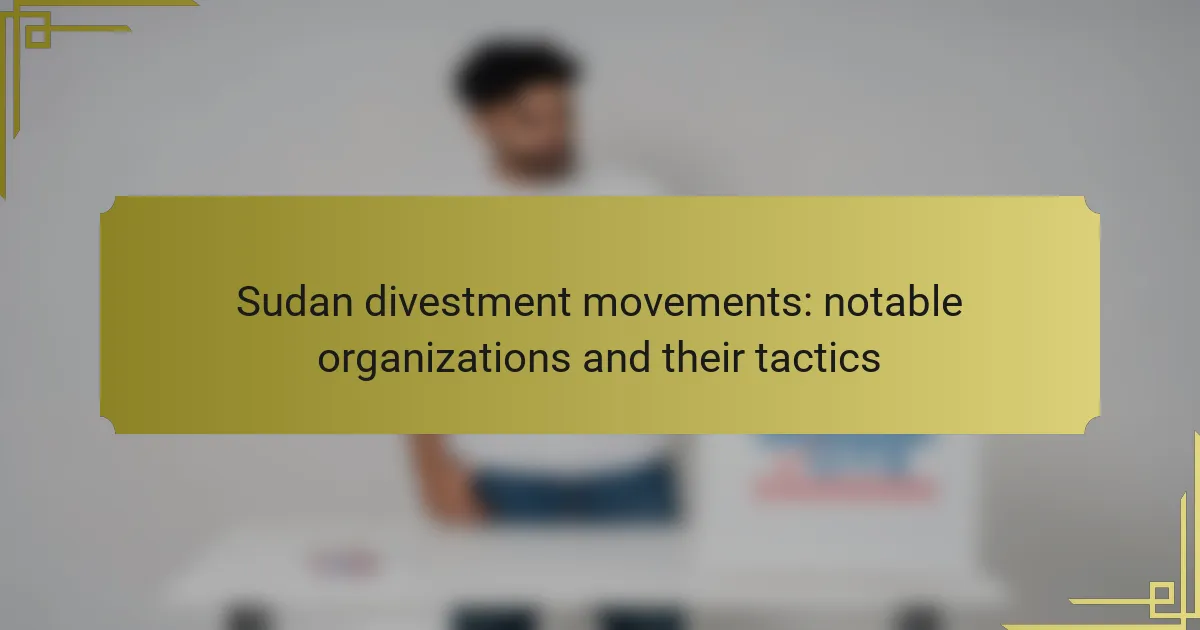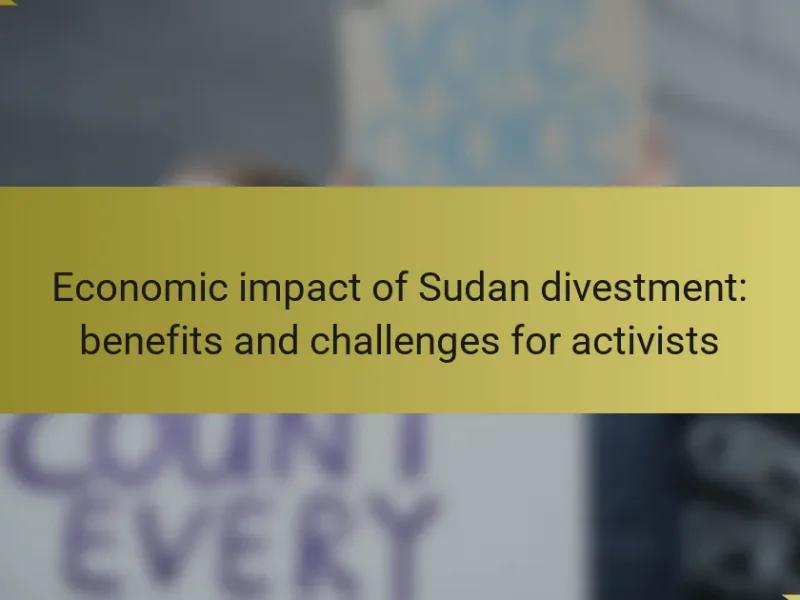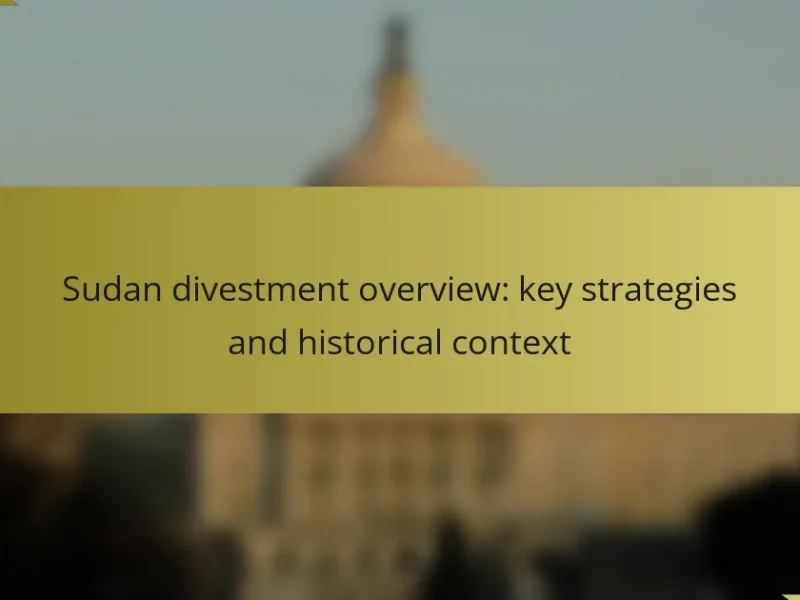Sudan divestment movements are initiatives focused on withdrawing investments from companies operating in Sudan, primarily in response to human rights abuses and conflicts, particularly during the Darfur crisis. Key organizations involved in these movements include the Sudan Divestment Task Force, Amnesty International, and Human Rights Watch, which advocate for ethical investment practices and aim to influence corporate behavior through public awareness campaigns and shareholder advocacy. Tactics employed by these organizations include grassroots mobilization, lobbying efforts, coalition building, and social media campaigns to apply economic pressure on companies and promote accountability for human rights violations in Sudan. The effectiveness of these movements is documented in various reports, highlighting their impact on corporate policies and legislative changes.
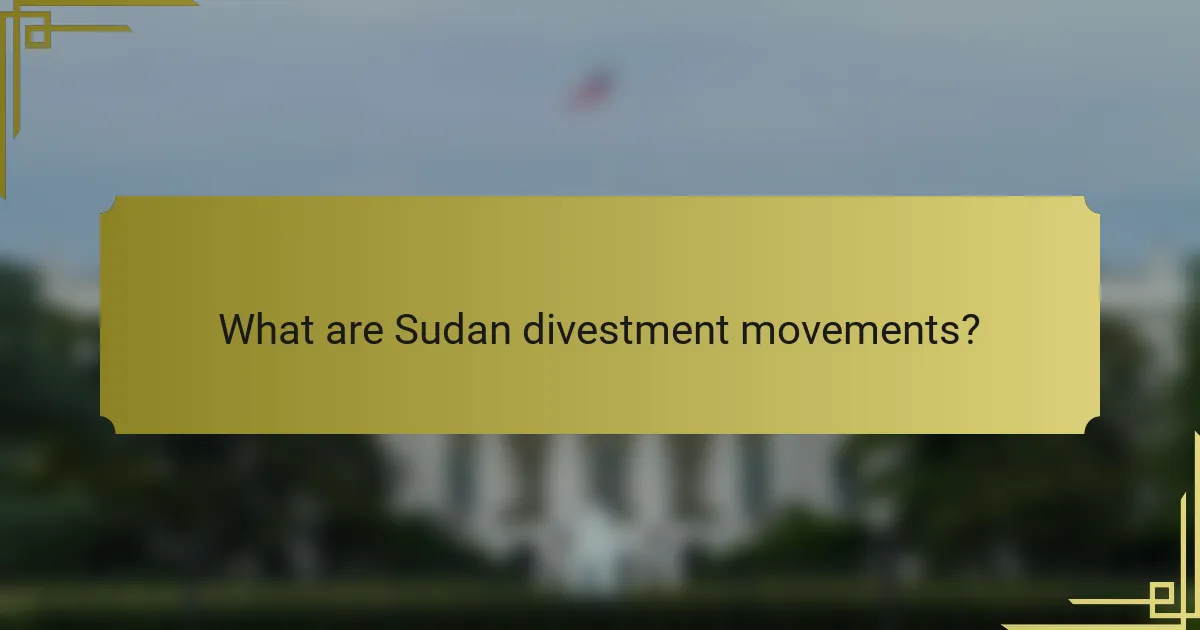
What are Sudan divestment movements?
Sudan divestment movements are initiatives aimed at withdrawing investments from companies operating in Sudan. These movements emerged in response to human rights abuses and conflicts in the region, particularly during the Darfur crisis. Activists and organizations advocate for divestment to pressure the Sudanese government to change its policies. Notable campaigns include efforts by groups like the Sudan Divestment Task Force. These movements utilize public awareness campaigns and shareholder advocacy to influence corporate behavior. Divestment is seen as a tool for promoting social justice and accountability. The effectiveness of these movements has been documented in various reports, highlighting their impact on corporate policies.
How did Sudan divestment movements originate?
Sudan divestment movements originated in response to the humanitarian crisis and violence in Sudan, particularly in Darfur. Activists and organizations sought to pressure companies and governments to withdraw investments from Sudan. This was aimed at holding the Sudanese government accountable for its actions against civilians. The movements gained momentum in the early 2000s. They were fueled by reports of atrocities and widespread media coverage. Notable organizations, like the Sudan Divestment Task Force, played a crucial role in mobilizing support. These organizations encouraged universities and pension funds to divest from companies operating in Sudan. The goal was to leverage economic pressure to influence policy changes.
What historical events led to the rise of divestment movements in Sudan?
The rise of divestment movements in Sudan was primarily driven by the Darfur conflict, which began in 2003. This conflict involved widespread violence and human rights abuses against civilians by government forces and militias. The international community responded with condemnation and calls for action. In 2006, the U.S. government imposed sanctions on Sudan due to these abuses.
These actions spurred grassroots campaigns advocating for divestment from companies operating in Sudan. Activists highlighted the connection between investments and the ongoing violence. Notable organizations, such as the Sudan Divestment Task Force, emerged to promote divestment efforts.
The divestment movements gained momentum as universities and pension funds began to withdraw investments. By 2010, several states in the U.S. had enacted laws to divest from Sudan. The combination of grassroots activism, government sanctions, and public awareness contributed significantly to the rise of these movements.
Who are the key stakeholders involved in these movements?
Key stakeholders in the Sudan divestment movements include non-governmental organizations, activist groups, and financial institutions. Non-governmental organizations such as the Sudan Divestment Task Force advocate for divestment from companies operating in Sudan. Activist groups, including Amnesty International, raise awareness about human rights abuses in Sudan. Financial institutions, like pension funds and university endowments, are targeted for divestment campaigns to pressure companies. These stakeholders collaborate to influence policy and mobilize public support. Their collective efforts aim to hold entities accountable for their investments in Sudan amidst ongoing conflict and human rights violations.
Why are divestment movements important for Sudan?
Divestment movements are important for Sudan because they aim to reduce financial support for oppressive regimes. These movements target companies and governments that fund activities contributing to human rights abuses. By withdrawing investments, activists seek to pressure the Sudanese government to change its policies. Historical instances show that divestment can lead to significant political and economic shifts. For example, divestment efforts during the apartheid era in South Africa contributed to the eventual end of the regime. Additionally, divestment movements raise awareness about the humanitarian crises in Sudan. They mobilize public opinion and encourage ethical investment practices. Overall, divestment movements serve as a tool for social change and accountability in Sudan.
What impact do divestment movements have on Sudan’s economy?
Divestment movements negatively impact Sudan’s economy by reducing foreign investment. These movements target companies linked to the Sudanese government and its human rights violations. As a result, many investors withdraw their capital. This withdrawal leads to a decrease in economic activity and job losses. Additionally, divestment can cause a decline in the value of Sudanese assets. The lack of investment hinders infrastructure development and public services. Consequently, the overall economic growth of Sudan is stunted. Research indicates that divestment campaigns have led to substantial financial losses for Sudanese industries.
How do these movements influence international relations with Sudan?
Divestment movements influence international relations with Sudan by pressuring governments and corporations to withdraw investments. These movements raise awareness of human rights abuses in Sudan. They mobilize public opinion against the Sudanese government. As a result, countries may impose sanctions or reduce diplomatic ties. For example, the Sudan Divestment Task Force has successfully encouraged states to divest from companies operating in Sudan. This divestment can lead to economic isolation for Sudan. Consequently, the Sudanese government may face increased pressure to change its policies. Thus, these movements play a critical role in shaping the international response to Sudan’s actions.
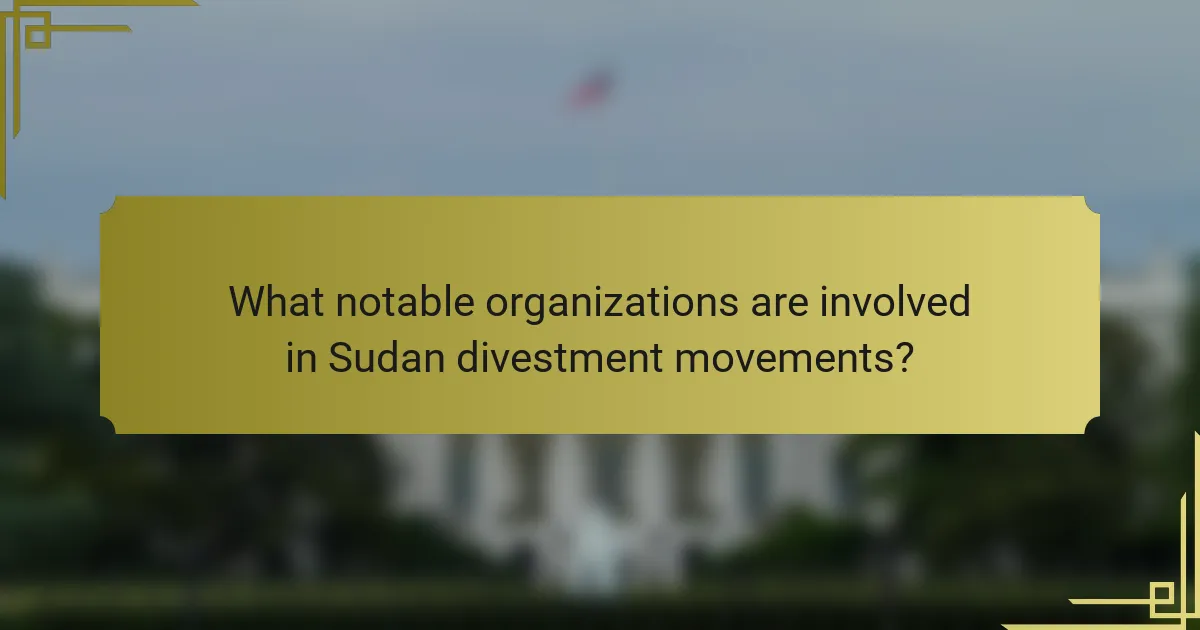
What notable organizations are involved in Sudan divestment movements?
Notable organizations involved in Sudan divestment movements include the Sudan Divestment Task Force, Amnesty International, and Human Rights Watch. The Sudan Divestment Task Force focuses on encouraging divestment from companies operating in Sudan. Amnesty International advocates for human rights and has called for divestment due to the Sudanese government’s actions. Human Rights Watch documents abuses in Sudan and supports divestment as a means to pressure the government. These organizations aim to raise awareness and promote ethical investment practices. Their efforts are part of a broader strategy to influence policy and corporate behavior regarding Sudan.
Which organizations are the most influential in these movements?
The most influential organizations in the Sudan divestment movements include the Sudan Divestment Task Force, Amnesty International, and Human Rights Watch. The Sudan Divestment Task Force was pivotal in advocating for divestment from companies operating in Sudan. Amnesty International has raised awareness about human rights violations in Sudan, influencing public opinion and policy. Human Rights Watch has documented abuses, providing critical evidence that supports divestment efforts. These organizations have collaborated with activists and policymakers to promote economic pressure on the Sudanese government. Their combined efforts have significantly impacted legislative actions and corporate decisions regarding investments in Sudan.
What are the missions and goals of these organizations?
The missions and goals of organizations involved in the Sudan divestment movements focus on promoting human rights and ending violence in Sudan. They aim to raise awareness about the humanitarian crisis in the region. These organizations advocate for economic pressure on the Sudanese government through divestment. They seek to mobilize public and institutional support for divestment strategies. Their efforts are directed towards influencing policymakers to take action against human rights violations. Many organizations also work to provide support for affected communities in Sudan. They emphasize the importance of corporate responsibility in addressing these issues. Overall, their missions are centered on achieving justice and accountability in Sudan.
How do these organizations collaborate with each other?
Organizations involved in Sudan divestment movements collaborate through strategic alliances and coordinated campaigns. They share resources, information, and expertise to amplify their impact. Collaborative efforts often include joint statements, public demonstrations, and coordinated lobbying efforts. For example, organizations may work together to influence policymakers or raise public awareness about divestment issues. They also participate in coalitions to unify their voices and strengthen their advocacy. These collaborations enhance their ability to mobilize support and achieve common goals. Evidence of successful collaboration can be seen in joint initiatives that have led to significant divestment commitments from major financial institutions.
How do these organizations raise awareness about divestment?
Organizations raise awareness about divestment through various strategies. They utilize social media campaigns to reach a broader audience. Educational workshops inform the public about the implications of divestment. Collaborations with universities and student groups amplify their message. Public demonstrations and rallies create visibility for their cause. They produce and distribute informative materials, such as pamphlets and videos. Engaging with local communities fosters grassroots support. Research reports highlight the economic and ethical reasons for divestment. These methods collectively enhance public understanding and encourage action.
What strategies do they use to engage the public?
Sudan divestment movements engage the public through various strategies. They utilize awareness campaigns to inform people about the humanitarian crisis in Sudan. Social media platforms are leveraged to spread messages quickly and widely. Grassroots organizing helps mobilize local communities for protests and events. Partnerships with universities enhance outreach to younger demographics. They also create petitions to gather support for divestment actions. Public demonstrations raise visibility and draw media attention to their cause. Educational events inform the public about the implications of divestment. These strategies collectively foster public engagement and advocacy for change.
How effective are their campaigns in changing perceptions?
The campaigns of Sudan divestment movements are effective in changing perceptions. These campaigns raise awareness about the human rights abuses in Sudan. They mobilize public support for divestment from companies operating in the country. Studies show that divestment campaigns can influence corporate behavior and investment decisions. For example, the Sudan Divestment Task Force reported significant financial impacts on targeted companies. Additionally, public opinion polls indicate increased awareness of the issues in Sudan due to these campaigns. Overall, the combination of grassroots activism and strategic messaging has proven successful in altering perceptions.
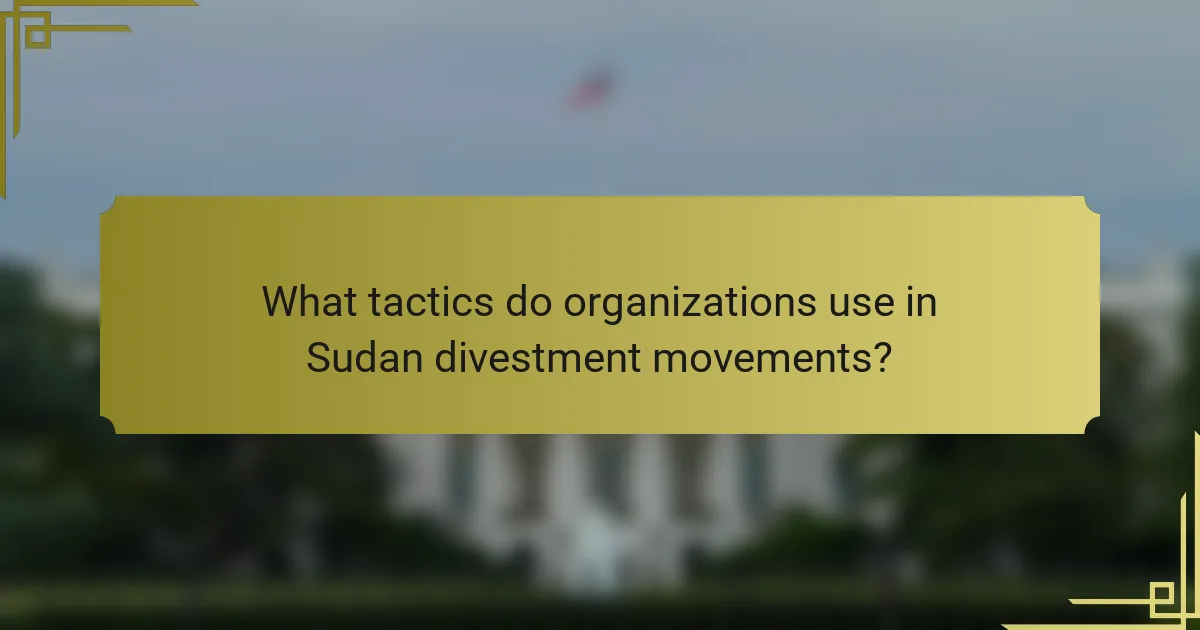
What tactics do organizations use in Sudan divestment movements?
Organizations use various tactics in Sudan divestment movements to pressure for change. They often employ public campaigns to raise awareness about the humanitarian crisis in Sudan. Grassroots mobilization is another common tactic, engaging local communities to advocate for divestment. Lobbying efforts target policymakers to influence legislation regarding Sudan. Organizations also create coalitions to strengthen their impact and reach. Economic pressure is applied by encouraging investors to withdraw from companies operating in Sudan. Research and reports are produced to highlight the consequences of investment in Sudan. Social media campaigns amplify their messages and mobilize support globally. These tactics collectively aim to promote ethical investment practices and hold accountable those contributing to human rights violations in Sudan.
What specific tactics are employed by these organizations?
Sudan divestment movements employ various tactics to advocate for change. These organizations utilize public awareness campaigns to educate the public about the situation in Sudan. They engage in grassroots organizing to mobilize community support. Lobbying government officials is another tactic used to influence policy decisions. Some organizations conduct shareholder advocacy to pressure companies to divest from Sudan. They also collaborate with international coalitions to amplify their efforts. Additionally, these organizations use social media platforms to spread their message widely. Fundraising activities help sustain their initiatives and support their campaigns. These tactics collectively aim to raise awareness and drive divestment from Sudan.
How do these tactics vary between organizations?
Tactics in Sudan divestment movements vary significantly between organizations. Some organizations focus on public awareness campaigns to educate consumers about the impacts of investments in Sudan. Others prioritize shareholder advocacy, engaging directly with companies to encourage divestment. Certain groups employ legal strategies, filing lawsuits to challenge investments in Sudanese companies. Additionally, grassroots mobilization tactics are utilized by some organizations to build community support for divestment. Each organization’s approach reflects its mission, resources, and target audience. For instance, larger NGOs may leverage their networks for broader influence, while smaller groups might concentrate on localized efforts. This diversity in tactics allows for a multifaceted approach to the divestment movement, enhancing overall effectiveness.
What role does social media play in their tactics?
Social media plays a crucial role in the tactics of Sudan divestment movements. It serves as a platform for raising awareness about the humanitarian crisis in Sudan. Organizations utilize social media to mobilize supporters and disseminate information rapidly. This approach helps in organizing protests and campaigns efficiently. Additionally, social media facilitates direct communication with policymakers and stakeholders. The use of hashtags amplifies their messages, reaching a broader audience. Research shows that social media engagement increases public pressure on corporations to divest. For example, campaigns like “Divest from Sudan” leverage social media to highlight corporate involvement. This strategy has proven effective in influencing corporate decisions and public opinion.
How do organizations measure the success of their tactics?
Organizations measure the success of their tactics through specific metrics and evaluations. They often track key performance indicators (KPIs) related to their goals. Common KPIs include financial outcomes, engagement levels, and public awareness. Surveys and feedback are frequently used to assess community response. Additionally, organizations analyze changes in policy or behavior resulting from their actions. Data analytics tools help quantify the impact of their campaigns. Case studies often provide insights into successful strategies. Reports and publications document the effectiveness of their tactics over time. These methods collectively validate the success of their initiatives.
What indicators are used to assess the effectiveness of divestment efforts?
Indicators used to assess the effectiveness of divestment efforts include changes in investment flows and public awareness levels. Investment flow changes can be measured by tracking the withdrawal of funds from targeted sectors. Public awareness levels can be gauged through surveys and media coverage related to divestment campaigns. Additionally, the response from targeted companies, such as policy changes or commitments to ethical practices, serves as a key indicator. The effectiveness can also be evaluated by monitoring legislative changes influenced by divestment movements. These indicators provide a comprehensive view of the impact and success of divestment efforts.
How do organizations adapt their strategies based on outcomes?
Organizations adapt their strategies based on outcomes by analyzing performance data and feedback. They assess the effectiveness of their current tactics. This evaluation informs necessary adjustments to enhance impact. For example, if a divestment campaign yields insufficient support, organizations may shift their messaging or target audience. They may also increase collaboration with local groups for better alignment. Historical data shows that adaptive strategies can lead to increased engagement and funding. The Sudan divestment movement illustrates this, as organizations refined their approaches based on community responses and financial results. Such adaptations ensure that strategies remain relevant and effective in achieving goals.
What practical steps can individuals take to support Sudan divestment movements?
Individuals can support Sudan divestment movements by advocating for divestment from companies linked to the Sudanese government. They can research and identify these companies through resources like the Sudan Divestment Task Force. Individuals should engage in campaigns that raise awareness about the humanitarian crisis in Sudan. They can participate in protests or events organized by advocacy groups. Writing to local representatives to urge them to support divestment initiatives is also effective. Additionally, individuals can share information on social media to educate others about the issue. Supporting organizations that focus on Sudan divestment financially or through volunteer work can amplify efforts. Finally, individuals can encourage businesses and institutions to adopt divestment policies.
Sudan divestment movements are initiatives aimed at withdrawing investments from companies operating in Sudan, primarily in response to human rights abuses and conflicts, particularly during the Darfur crisis. This article outlines the origins of these movements, key stakeholders involved, and the historical context that led to their emergence. It also highlights notable organizations such as the Sudan Divestment Task Force and Amnesty International, detailing their missions, tactics, and collaborative efforts to raise awareness and influence corporate behavior. Additionally, the article examines the impact of divestment on Sudan’s economy and international relations, as well as practical steps individuals can take to support these movements.
